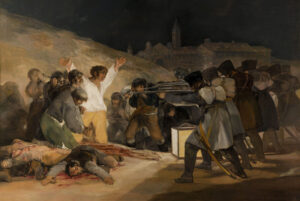Among the weapons the Germans introduced was poison gas. They used it first in 1915 against the Russians and later against the French and British, in defiance of the 1907 Hague Conference’s proscriptions of its use. Along with tear gas and mustard gas, the term gas mask came into the language, as both sides provided defense against such attacks. Tear gas, of course, is still used by military and police officers for crowd control and similar situations. Another new weapon was the flamethrower, a translation of the German Flammenwerfer, first used by the Germans at the Battle of Verdun on February 21, 1916.
World War I also involved aerial warfare, which gave rise to several new expressions. The biplane of the early war period, a rickety wooden frame with wings joined to each other by struts and wires, resembled a standard box made from thin strips of wood. The noun crate came to denote a military aircraft, especially one that was old. This slang term was later applied to older, junky automobiles.
The term belly landing seems self-explanatory; it meant landing an aircraft directly on its underside, without benefit of landing gear. Another was Chinese landing, a clumsy landing made with one wing of the aircraft angled acutely toward the ground. According to a Popular Science article of 1928, the term is derived from the supposed Asian flavor of the words “one wing low” (cited in the Random House Dictionary of Modern Slang).
Balls to the wall, meaning at all-out speed, alludes to full throttle. The ball-topped throttle in a piston-engine airplane would be pushed forward until it nearly touched the firewall. Aviators also engaged in stunts like the barrel roll, either to evade pursuers or simply for the practice, rolling the airplane over and over, like going around a barrel.
The expression eyewash means anything intended to deceive or mislead, and was applied to cleaning up for inspection by a superior, or glossing over the number of casualties in a report, or regulations imposed to impress the public rather than to achieve meaningful results. Since then, in civilian life, the term has been used similarly, as in “Russia’s insistence that Georgia threatened South Ossetia was just so much eyewash.”
MHQ
Christine Ammer is the author of several dozen wordbooks, including The Facts on File Dictionary of Clichés (2006).





